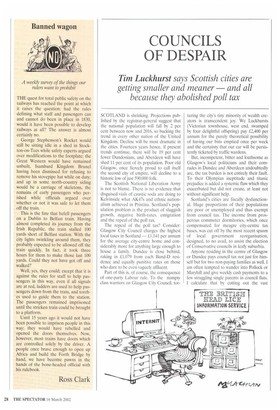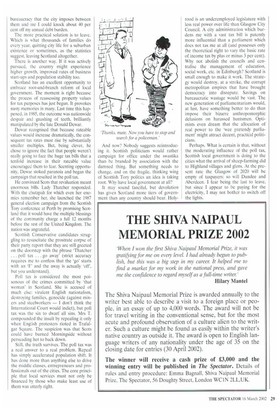COUNCILS OF DESPAIR
Tim Luckhurst says Scottish cities are
getting smaller and meaner — and all because they abolished poll tax
SCOTLAND is shrinking. Projections published by the registrar-general suggest that the national population will fall by 2 per cent between now and 2016, so bucking the trend in every other nation of the United Kingdom. Decline will be most dramatic in the cities. Fourteen years hence, if present trends continue, there will be 19 per cent fewer Dundonians, and Aberdeen will have shed 11 per cent of its population. Poor old Glasgow, once fiercely proud to call itself the second city of empire, will decline to a historic low of just 590.000 folk.
The Scottish National Liberation Army is not to blame. There is no evidence that disguised vials of caustic soda are doing to Kelvinside what AK47s and ethnic nationalism achieved in Pristina. Scotland's population problem is the product of sluggish growth, negative birth-rates, emigration and the repeal of the poll tax.
The repeal of the poll tax? Consider: Glasgow City Council charges the highest local taxes in Scotland — £1,141 per annum for the average city-centre home and considerably more for anything large enough to house a family. Dundee is close behind, raking in £1,079 from each Band-D residence and equally punitive rates on those who dare to be even vaguely affluent.
Part of this is, of course, the consequence of one-party Labour rule. To the numpty class warriors on Glasgow City Council, tor turing the city's tiny minority of wealth creators is transcendent joy. We Luckhursts (Victorian townhouse, west end, swamped by four delightful offspring) pay £2,400 per annum for the purely theoretical possibility of having our bins emptied once per week and the certainty that our car will be persistently ticketed by traffic wardens.
But, incompetent, bitter and loathsome as Glasgow's local politicians and their comrades in Dundee and Aberdeen undoubtedly are, the tax burden is not entirely their fault. To their Olympian ineptitude and titanic prejudice is added a systemic flaw which they exacerbated but did not create, at least not without significant help.
Scotland's cities are fiscally dysfunctional. Huge proportions of their populations are poor or unemployed and thus exempt from council tax. The income from prosperous commuter dormitories, which once compensated for meagre city-centre tax bases, was cut off by the most recent spasm of local government reorganisation, designed, to no avail, to assist the election of Conservative councils in leafy suburbia.
Anyone residing in the centre of Glasgow or Dundee pays council tax not just for himself but for two non-paying families as well. I am often tempted to wander into Pollock or Maryhill and give weekly cash payments to a few struggling single parents in council flats. I calculate that by cutting out the vast bureaucracy that the city imposes between them and me I could knock about 40 per cent off my annual debt burden.
The more practical solution is to leave. Which is what thousands of families do every year, quitting city life for a suburban existence or sometimes, as the statistics suggest, leaving Scotland altogether.
There is another way. If it was actively pursued, the country might experience higher growth, improved rates of business start-ups and population stability too.
Scotland has an excellent opportunity to embrace root-and-branch reform of local government. The moment is right because the process of reassessing property values for tax purposes has just begun. It provokes nasty memories in many. Last time this happened, in 1985, the outcome was nationwide despair and gnashing of teeth, brilliantly manipulated by the late Donald Dewar.
Dewar recognised that because rateable values would increase dramatically, the consequent tax rates must rise by substantially smaller multiples. But, being clever, he chose to ignore the fact that people weren't really going to face the huge tax bills that a tenfold increase in their rateable value encouraged them to fear. Scenting opportunity, Dewar stoked paranoia and began the campaign that resulted in the poll tax.
He convinced Scots that revaluation meant enormous bills. Lady Thatcher responded. With the chutzpah for which even her enemies remember her, she launched the 1987 general election campaign from the Scottish Tory conference at Perth by promising Scotland that it would have the multiple blessings of the community charge a full 12 months before the rest of the United Kingdom. The nation was ungrateful.
Scottish Conservative candidates struggling to resuscitate the prostrate corpse of their party report that they are still greeted on the doorstep with the phrase 'Thatcher . . . poll tax . . . go away' (strict accuracy requires me to confess that the 'go' starts with an `F" and the away is actually 'off, but you understand).
Poll tax is considered the most poisonous of the crimes committed by that woman' in Scotland. She is accused of much else: virulent English nationalism, destroying families, genocide (against miners and steelworkers — I don't think the International Court would indict), but poll tax was the sin to dwarf all sins. Mrs T. compounded the insult by repealing it only when English protesters rioted in Trafalgar Square, The suspicion was that Scots could have burned Morningside without persuading her to back down.
Still, the truth survives. The poll tax was a real answer to a real problem. Repeal has simply accelerated population shift. It has done more than anything else to drive the middle classes, entrepreneurs and professionals out of the cities. The core principle that local services must not only be financed by those who make least use of them was utterly right.
And now? Nobody suggests reintroducing it. Scottish politicians would rather campaign for office under the swastika than be branded by association with the damned thing. But something needs to change, and on the fragile, thinking wing of Scottish Tory politics an idea is taking root. Why have local government at all?
It may sound fanciful, but devolution has given Scotland more tiers of government than any country should bear. Holy rood is an underemployed legislature with less real power over life than Glasgow City Council. A city administration which burdens me with a vast tax bill is patently more influential than a parliament which does not tax me at all (and possesses only the theoretical right to vary the basic rate of income tax by plus or minus 3 per cent). Why not abolish the councils and centralise the management of education, social work, etc. in Edinburgh? Scotland is small enough to make it work. The strategy would destroy, at a stroke, the corrupt metropolitan empires that have brought democracy into disrepute. Savings on bureaucratic wastage would be vast. The new generation of parliamentarians would, at last, have something better to do than impose their bizarre anthropomorphic delusions on harassed huntsmen. Optimists even dream that the allocation of real power to the 'wee pretendy parliament' might attract decent, practical politicians.
Perhaps. What is certain is that, without the moderating influence of the poll tax, Scottish local government is doing to the cities what the arrival of sheep-farming did to Highland villages and glens. At the present rate the Glasgow of 2020 will be empty of taxpayers: so will Dundee and Aberdeen. I fear being the last to leave, but since I appear to be paying for the electricity, I may not bother to switch off the lights.

















































































 Previous page
Previous page